Today's Thursday • 14 mins read
— By Dr. Sandip Roy.
I have been reading and writing on happiness since 2014. I learned that many beliefs about happiness are just myths.
- Myth: I cannot be happy now; I have so many problems.
- Truth: You can be happy for now; it won’t make your problems worse.
- Myth: A smile is happiness. Happiness is a smile.
- Truth: Many smiles hide sadness inside. You don’t have to look happy to be happy.
Here are the 10 happiness myths that make us miserable, from positive psychology:
Myth 1. Happiness is a constant state.
Truth: No, happiness is not a constant state.
People often say, “Once I’m happy, I’ll always be happy!”
No, being happy doesn’t protect you from bad things happening in the future. The good feelings you have on your best days won’t last forever.
Some of us are naturally happier. But even in them, happiness doesn’t maintain the same level. Moods, thoughts, and experiences can change it at any time.
That’s how life is designed. We have to, and it’s healthy to, experience a wide spectrum of emotions as we live. Sadness, disappointment, and frustration are as natural as Joy, contentment, and satisfaction.
Happiness is a fleeting experience for a reason: if our ancestors were always in a happy mood, they probably wouldn’t have noticed the surrounding dangers.
When you expect to stay happy all the time, any little dissatisfaction can make you feel inadequate.
I just want to quickly add that you don’t always need to be happy to feel successful. Despite what the marketing industry tells us:
- BMW: “Joy is BMW.”
- Coca-Cola: “Choose Happiness.”
- Johnnie Walker: “Joy Will Take You Further.”
Being unhappy sometimes is not a personal failure.

Myth 2. Happiness depends on circumstances.
Truth: Yes, somewhat (much less than what we imagine).
Many people believe how happy you are depends on how good are your external circumstances.
Wealth, stuff, fame, or success do not factor in as much for our long-term happiness. As per The Happiness Formula, just around 10% of your total happiness depends on your circumstances.
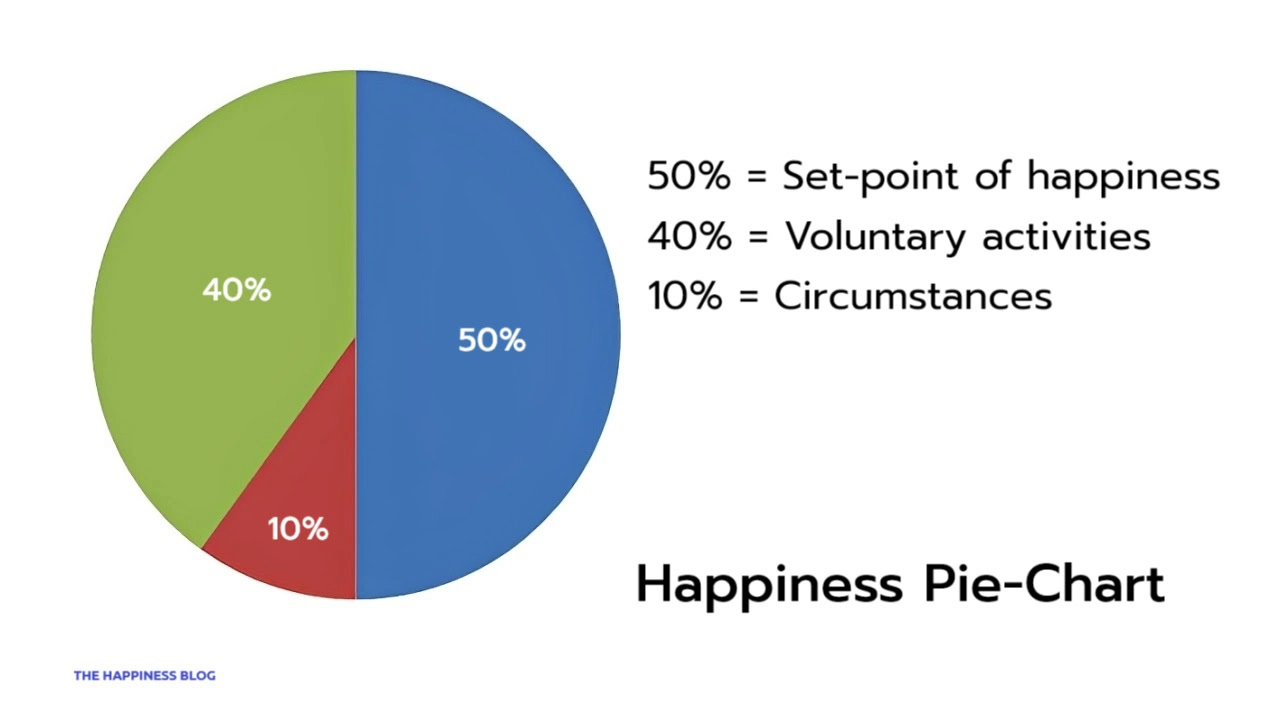
Your happiness depends more on your intentional activities. Happy things you do on purpose, like feeling gratitude, going on a holiday, exercising, or spending time with friends, are more likely to boost your happiness.
- You can cultivate a positive mindset through practices like mindfulness and self-care.
- You can learn to recognize your biases and avoid them to make better decisions.
So, mainly, happiness is an inside job.
Myth 3. Money can buy happiness.
Truth: Money can buy happiness for people who can’t afford the necessities of life, but not much once they have enough income to live comfortably.
Spike Mulligan, the British comedian, once said, “All I want is the chance to prove that money can’t make me happy.” You might be smiling approvingly at that.
But research shows once our basic needs are met, we reach the happiness plateau. And additional wealth does not lead to any major increase in our overall happiness.
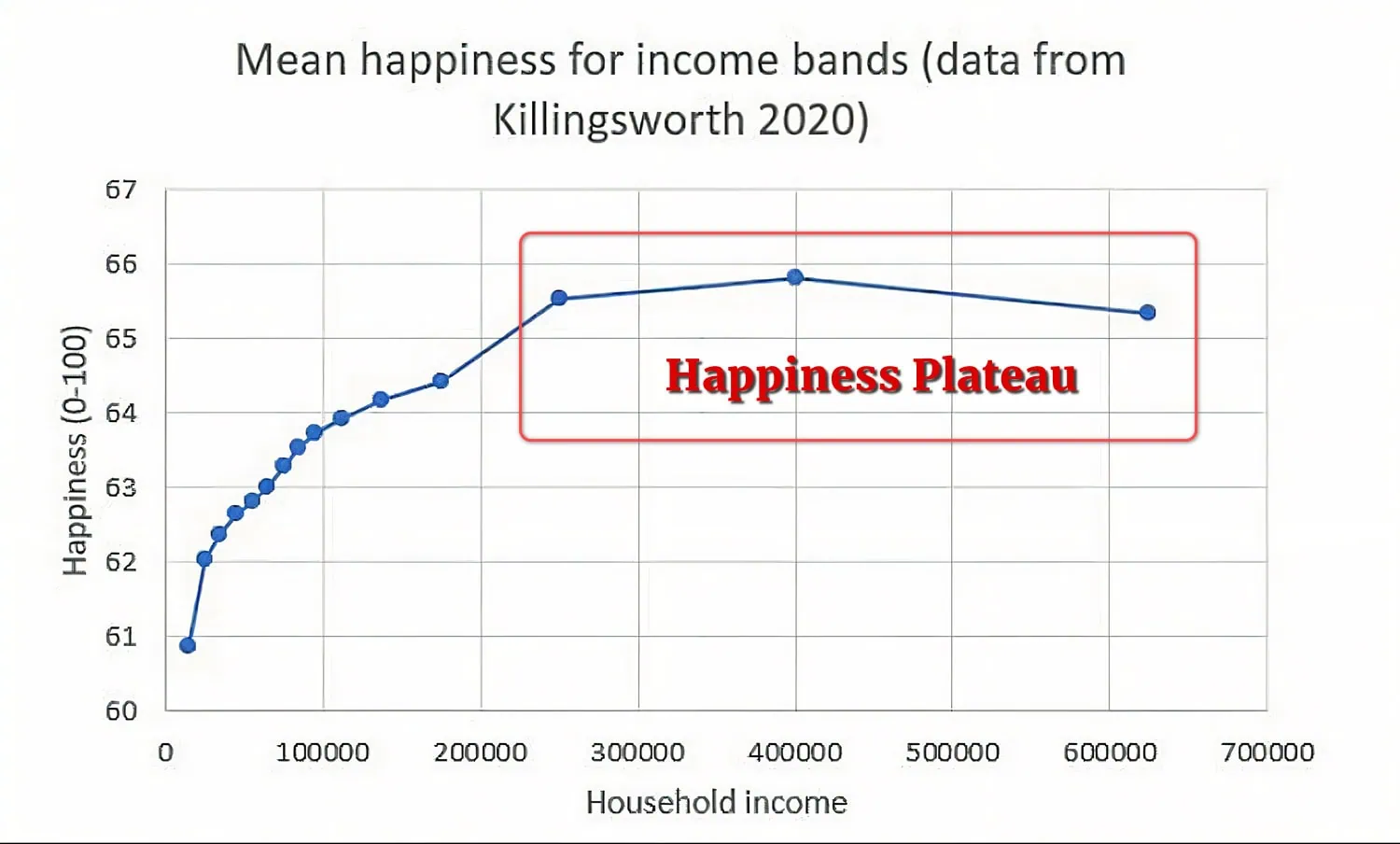
- Myth: Once we get rich, we will never have to worry about being sad again.
- Myth: When we have enough money, all unhappiness-causing issues will get fixed.
So, yes, money lifts us out of poverty-induced misery, but it doesn’t keep giving forever.
Moreover, spending X dollars on buying an experience (say, a holiday) gives more happiness than the same X dollars spent on buying a thing (say, a watch).
- The item you bought gathers dust on your shelf and your happiness for it grows less intense.
- The trip you took grows fond memories and makes you feel good seeing those pictures again.
To know more about it, read this: Psychology of “Happy Money”: How Can Your Money Buy Happiness?
Myth 4. Happiness is getting rid of negative emotions.
Truth: Happiness is not merely an absence of negative emotions.
The World Health Organization (WHO) defines health as follows:
Health is a state of complete physical, mental and social well-being and not merely the absence of disease or infirmity.
— WHO
You may not have any illnesses, but it does not automatically mean you are completely healthy. It’s the same with happiness and mental well-being.
“Why look sad? Why can’t you just smile? Try smiling and see how it makes you happy.”
— Wrong Advice
People may believe that happiness is the absence of negative emotions such as sadness, anger, or anxiety. But it’s not so.
Our negative emotions have intrinsic value; we do need them.
True happiness is more than just material possessions. It includes our challenges, times with friends and family, and our ikigai (reason for existence).
Happiness is having fewer negative emotions and more positive ones, but it’s not healthy to suppress your negative emotions.
Moreover, it is not possible to eliminate negative emotions.
- You may express your happiness with both a pleasant surprise and a contented sigh. It can even show up as tears.
- Happiness is not one-dimensional. Quiet joy, serene contentment, and boisterous excitement, all contribute to our overall well-being.
- Happiness can be sitting on an iron bench, watching the clouds go by, and feeling the breeze on your face. It can also mean being so deeply immersed in a task that you lose track of time.
Myth 5. Happiness is only for special people.
Truth: Happiness is not just for special people.
No matter what anybody tells you, happiness is not just for like the lucky or the wealthy ones among us.
Happiness is a universal human experience that is available to everyone, not just special people.
More surprise: The common belief that poor people are unhappy by definition is wrong.
- A study found that people living in slums have greater levels of life satisfaction than we might expect, given their poverty and circumstances (Sulkers & Loos, 2022).
- Similarly, in a study among the poorest of the poor in South Africa, researchers found that landfill waste pickers scored higher on life satisfaction than the national average (Blaauw et al., 2020).
Some people may have a natural disposition towards happiness, but it is a state that can be cultivated and nurtured through various means.
Myth 6. Happiness is for those who know how to be “happy.”
Truth: Happiness is not just for those who are “happier” types and know how to be “happy.”
Even those who have difficulty expressing happiness, showing positive feelings exuberantly, or appearing just cheerful and hopeful can be joyful.
Happiness can be found through, among other things, gratitude, forgiveness, good memories, the “flow” of being immersed in an activity, and having a feeling of purpose in life.
Even people with depression, who have low hopes for the future and often overthink, can feel happier through interventions like The Three Good Things.
Some people are terrified of being happy; this is called cherophobia. Even these people can find help in shifting their perspective and letting themselves be happy.
Happiness-boosting activities can help almost anyone to be happy, even if they are not too good at expressing it or finding it in their daily lives.
Myth 7. Happiness is only for the present moment.
Truth: Happiness is not just for the present moment. Though, the present moment is the only moment we actually feel happiness.
Some say, “If you aren’t happy about this thing now, you can never be happy about it.” Ah, no!
Happiness is only for the present moment. You can be happy for a future or past event, too.
Thoughts of things you did or happened in the past can bring you joy. Hoping for a brighter tomorrow can raise your happiness.
We need both happiness of the past (“I lived a good life”) and happiness of the future (“I’m hopeful about my future”).
A related happiness myth is postponing happiness.
Some choose not to be happy until they get a certain salary, buy a house, get a new partner, or reach a career milestone. But happiness science says waiting to be happy until something big happens is not a good idea.
Don’t put off being happy when you can be happy now.
Myth 8. Happiness is only for the young.
Truth: Happiness is not just for the young among us.
Happiness can be experienced at any age and stage of life. There may be new challenges and things to learn as you get older, but you can still choose to be happy.
Surprise: Studies show that as we age, we become happier and more satisfied with our lives in general, especially after age 60.
Data from the Gallup World Poll and Brookings Institution (2005–2014) shows life satisfaction tends to follow a “U-shaped curve”:
- High life satisfaction in youth (16–25): People tend to feel optimistic and full of potential, and dreams and possibilities still feel wide open.
- Life satisfaction declines through midlife (around 45–55): Often loaded with responsibilities: career, parenting, financial pressures, health concerns, and reflection on unmet goals. Commonly known as the “midlife crisis,” though not everyone experiences it dramatically.
- Life satisfaction rises again in older age (60 and beyond): Reasons for rising life satisfaction include having greater emotional regulation and acceptance, lower stress from parenting or work, more time for personal meaning and connection, and better appreciation of life.
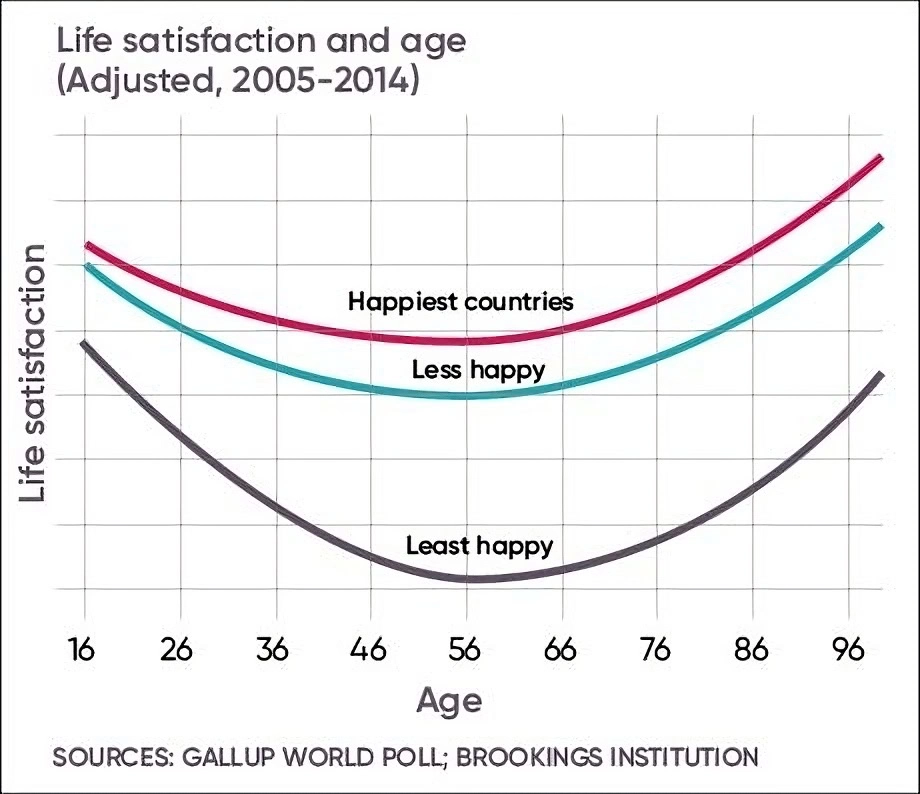
Myth 9. Happiness is only for the religious or spiritual.
Truth: Happiness is not only for the religious or spiritual.
Religious people are happier overall, as research shows. But believing that happiness is only for religious people is a myth that keeps many people miserable.
Happy people see their religion not so much as something they “do” as what they “are”.
– Swinyard & Kau, 2001
Happiness can be found through various means, such as mindfulness, self-care, and personal growth.
The practice of these can bring a sense of inner peace and well-being, regardless of one’s religious or spiritual beliefs.
An atheist can be as happy as anyone who follows a religion or faith.
Myth 10. Happiness is the ultimate goal.
Truth: Happiness is not the ultimate goal.
Pursuing happiness tends to reduce happiness.
While happiness is a desirable state, studies show that our obsession with happiness can make us less content with our lives and less effective at reaching our actual goals.
Being happy is an important aspect of a fulfilling life, but that per se is not the greatest goal. So, don’t pursue happiness to get happier.
Don’t exclusively focus on happiness. Focus on things like improving your values, setting new goals, and interpreting situations positively. This will help you achieve greater overall well-being.
Meaning, purpose, and connection with others are also critical elements that contribute to a fulfilling life.
- A study by Mauss & Tamir found that a constant desire to feel happier can make people feel more lonely and reduce everyday contentment.
- Kim & Maglio did four studies to prove that trying to be happy (either as a personality trait or by direct manipulation) consistently leads to feeling like there is less time available.
“People who pursue happiness often feel like they do not have enough time in the day, and this paradoxically makes them feel unhappy.”
Kim & Maglio. Vanishing time in the pursuit of happiness, 2018.
Pursuing happiness can hurt your well-being. Be happy, but balance it with other aspects of well-being.
What is the most common happiness myth?
“Someday, I’ll be happy, and then I’ll never be unhappy again.”
— The Mythical Happiness Idea
Another happiness myth is that getting a lot of money, power, and possessions will keep us happy for a long time. But studies show good circumstances that bring high happiness do not sustain over time.
This study surveyed 3,362 Swedish lottery winners, who won at least $100,000. After 5–22 years, their happiness and mental health did not change too much. However, they had a long-lasting increase in overall life satisfaction.
So, no, a happiness boost after a great event does not last long. It’s due to a psychological effect called the “hedonic treadmill” or “hedonic adaptation.” We quickly get used to better circumstances, and return to our baseline level of happiness.
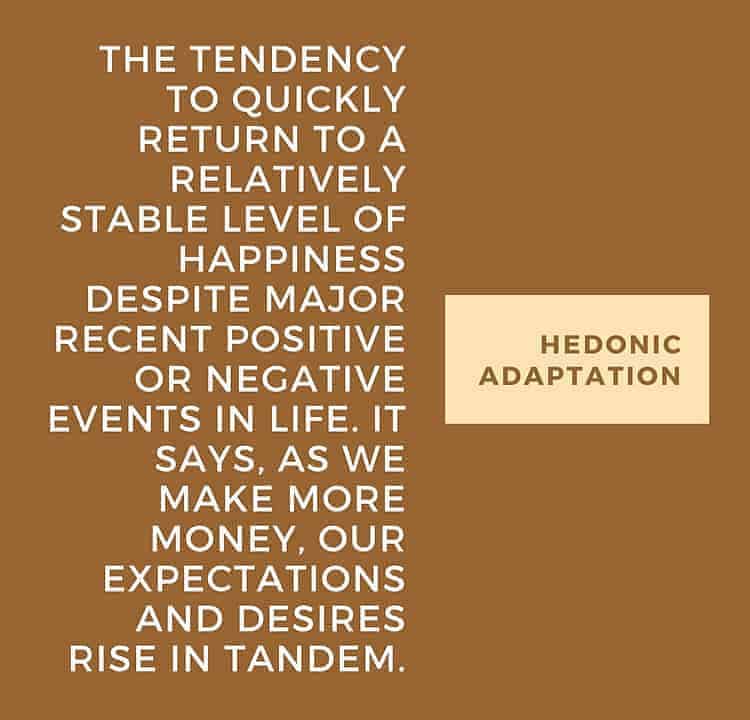
Eleventh Happiness Myth: All happiness is the same.
Truth: Happiness is not a single thing or of a single type.
Leo Tolstoy’s novel Anna Karenina begins with this line:
“All happy families are alike; each unhappy family is unhappy in its own way.”
– Leo Tolstoy in Anna Karenina
It gave the Anna Karenina principle, which says:
- happy people have the same things to make them happy, while
- unhappy people have many different things to make them unhappy.
The Anna Karenina principle also implies that happiness is harder to get than sadness, since many paths lead to sadness while only one path leads to happiness.
So, to get happy, you can fail in many ways, but there is only one way to succeed.
Aristotle expressed a similar thought when he observed in The Nichomachean Ethics, “For men are but good in one way, but bad in many.”
But both Tolstoy and Aristotle were wrong, according to science.
Positive psychology teaches us that all of us are a mixture of strengths and weaknesses.
No one has it all, and no one lacks it all.
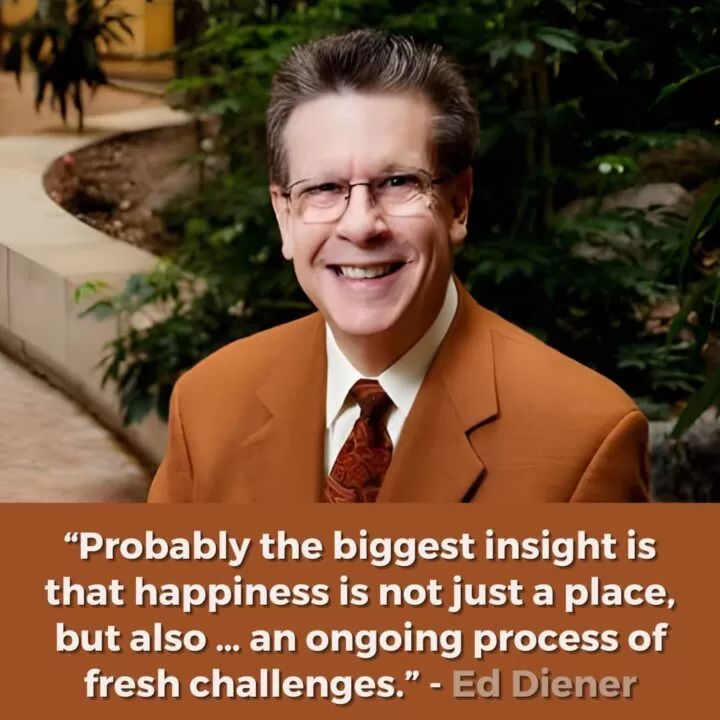
So, happiness is simple, in the sense that you instantly know when you’re happy.
But happiness is also complex, in the sense that different people may feel the same event differently, shaped by factors like their health, social support, financial security, and age.
- A grand family reunion. Someone in good health with a steady income would be excited, eager to spend time with their cousins, kids, and other relatives and have a good time. However, an elderly person may not be as happy because traveling is hard. A member of the family who is financially struggling may not feel as excited because they can’t buy gifts for people they will meet.
- A promotion at work. This would bring immense happiness to someone who values career growth and has a strong support system. However, another person may see the same promotion as a hassle. They would have to mediate team disputes, manage project timelines, and travel half the month, making this promotion a cause for dread.
So, it’s a myth that happiness is singular for all of us and that all happy people are alike.
Truth is, happiness can be different for different people.
FAQs
1. Why are you less happy after achieving a long-desired goal?
Success does not guarantee sustained happiness. After reaching a goal, we become less happy and eventually feel almost normal or even a little sad. This is due to the arrival fallacy.
2. How can we redefine success beyond happiness?
Three quick tips to redefine success beyond happiness:
- Focus on your experiences as you pursue your goals, without trying to postpone your happiness.
- Set goals that align with your passions and values, not what others want you to achieve.
- Accept failures and obstacles as part of your success process.
3. According to Sonja Lyubomirsky, what happiness myths are making us unhappy?
Sonja Lyubomirsky says these are 3 three main happiness myths:
- Myth: Happiness is a destination. Happiness is not something to achieve once we reach a certain point in our lives, such as getting married, having children, or getting a promotion. Rather, happiness exists on the path of our journey.
- Myth: Happiness is positive emotions. Happiness can be more than positive emotions in the present moment. One may be sad right now, but he or she has wonderful memories to brighten their day.
- Myth: Happiness is a personality trait. Happiness is not something that we are born with. Our happiness levels are not fixed. Lyubomirsky tells us that all of us can learn happiness skills.
Final Words
Don’t worry about looking happy. Happiness is an inside job.
Your happiness can be a peaceful feeling inside. Or it could be an inner strength as you go through hard times; that resilience is a form of happiness.
Finally, stop pursuing happiness as a goal; it doesn’t end at any stop.
√ Also Read: How To Be Happy: 25 Science-Backed Tips For A Happy Day
√ Please share it with someone if you found this helpful.
» You deserve happiness! Choosing therapy could be your best decision.
...
• Disclosure: Buying via our links earns us a small commission.